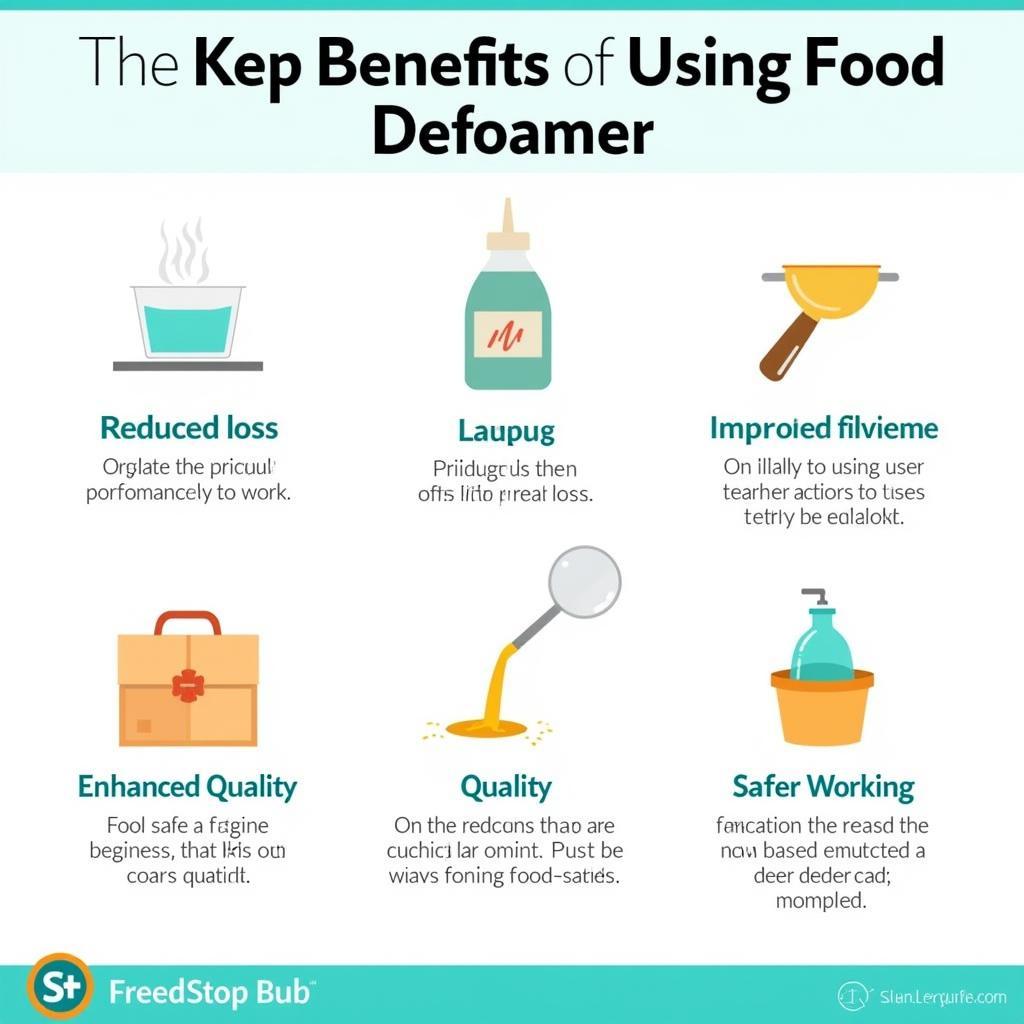Food Defoamer plays a crucial role in various food processing applications. It controls and prevents unwanted foam, ensuring smooth operations and high-quality end products. From reducing product loss to improving efficiency, understanding the intricacies of food defoamers is essential for any food manufacturer.
What is Food Defoamer and Why is it Important?
Food defoamer, also known as an anti-foaming agent, is a food-grade additive used to reduce or eliminate foam in food processing. This foam, often caused by agitation, aeration, or fermentation, can create problems in production, affecting everything from fill levels to sanitation. Defoamers work by destabilizing the foam’s structure, causing the bubbles to collapse. Why is this important? Well, uncontrolled foaming can lead to product loss, equipment malfunction, and even safety hazards. Defoamers help maintain consistent product quality, improve processing efficiency, and ensure a safe working environment.
Types of Food Defoamers: Exploring the Options
Several types of food defoamers are available, each with its own unique properties and applications. Common types include silicone-based defoamers, oil-based defoamers, and powder defoamers. Silicone-based defoamers are highly effective at low concentrations, while oil-based defoamers are often preferred for their natural origin. Powder defoamers are easy to handle and store, making them a practical choice for certain applications. Choosing the right type of defoamer depends on factors such as the specific food product, processing conditions, and desired outcome.
Silicone-Based Defoamers: A Closer Look
Silicone-based defoamers are known for their high efficiency and versatility. They work by disrupting the surface tension of the foam, causing it to collapse quickly. This makes them suitable for a wide range of food processing applications.
Oil-Based Defoamers: A Natural Approach
For manufacturers seeking natural solutions, oil-based defoamers provide an excellent alternative. Derived from edible oils, these defoamers are often preferred for organic or natural food products.
How to Choose the Right Food Defoamer
Selecting the appropriate food defoamer requires careful consideration of various factors. The type of food being processed plays a crucial role, as different foods have different foaming tendencies. Processing temperature, pH, and the presence of other ingredients can also influence defoamer performance. Consulting with a defoamer specialist can help determine the optimal choice for your specific needs.
Food Defoamer Regulations and Safety
Food defoamers are subject to strict regulations to ensure food safety. Regulatory bodies such as the FDA in the United States provide guidelines on the permissible levels of defoamers in food products. Manufacturers must adhere to these regulations to ensure consumer safety and product compliance.
“Choosing the right food defoamer is crucial not only for product quality but also for ensuring compliance with food safety regulations,” says Dr. Emily Carter, a leading food scientist specializing in food additives. “Understanding the specific needs of your application and working with a reputable supplier can help you make informed decisions.”
Benefits of Using Food Defoamer
The use of food defoamer offers numerous benefits in food processing. It reduces product loss due to foaming, improves processing efficiency, and enhances product quality. Defoamers also contribute to a safer working environment by minimizing foam overflow and spills.
“In my experience, the use of food defoamer has significantly improved the efficiency of our production lines,” adds John Miller, a production manager at a leading food processing facility. “It has also helped us reduce waste and maintain consistent product quality.”
 Benefits of Using Food Defoamer in Food Production
Benefits of Using Food Defoamer in Food Production
Conclusion: Mastering Foam Control in Food Processing with Food Defoamer
Food defoamer is an indispensable tool for efficient and effective food processing. By understanding the different types of defoamers, their applications, and the regulatory landscape, food manufacturers can optimize their processes, minimize waste, and deliver high-quality products. Proper selection and application of food defoamer is essential for achieving optimal results and ensuring food safety.
FAQ
- What are the common types of food defoamers?
- How does food defoamer work?
- Is food defoamer safe for consumption?
- How do I choose the right food defoamer for my application?
- What are the regulations surrounding the use of food defoamers?
- What are the benefits of using food defoamer?
- Where can I purchase food-grade defoamer?
When you need support, please contact Phone Number: 02437655121, Email: minacones@gmail.com Or visit us at: 3PGH+8R9, ĐT70A, thôn Trung, Bắc Từ Liêm, Hà Nội, Việt Nam. We have a 24/7 customer service team.